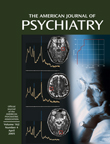Neuropsychological Impairment and Its Neurological Correlates in Adult Offspring With Heightened Risk for Schizophrenia and Affective Psychosis
Abstract
OBJECTIVE: Schizophrenia is generally considered to be a neurodevelopmental disorder reflected in findings of neuropsychological impairments and neurological abnormality in patients and their relatives. The authors investigated whether neuropsychological impairments are related to neurological abnormality and whether such deficits also characterize risk for affective psychosis. METHOD: In a longitudinal study with a 93% rate of effective follow-up, the authors investigated neuropsychological impairment and its relation to neurological abnormality at a mean age of 22.3 years in 74 offspring of mothers with a history of psychotic disorders (38 offspring with heightened risk for schizophrenia and 36 with risk for affective psychosis) and 88 normal-risk offspring born to mothers with no history of psychosis. RESULTS: Offspring with genetically heightened risk for schizophrenia showed significantly impaired verbal memory, selective attention, and grammatical reasoning, compared with normal-risk offspring. Having impaired verbal memory, attention, and grammatical reasoning functions identified a significantly larger subgroup (16%) among offspring with heightened risk for schizophrenia than among offspring with heightened risk for affective psychosis (0%) and among normal-risk offspring (3%). Multiple neuropsychological functions were significantly related to neurological abnormality in offspring with heightened risk for schizophrenia and in normal-risk offspring but not among offspring with heightened risk for affective psychosis. The extension of schizophrenia and affective psychosis risk groups to include additional offspring of mothers with psychosis-spectrum disorders yielded results similar to those for the core risk groups. CONCLUSIONS: The neurocognitive dysfunction attending heightened risk for schizophrenia is likely based on genetically mediated neurodevelopmental factors, with schizophrenia and affective psychosis belonging to different biological spheres.



